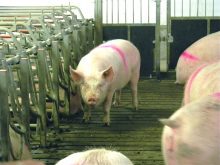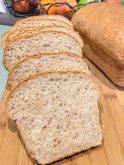An ongoing project at the Rossburn Elementary School is definitely not for the squeamish, but it plays a very important role in waste reduction. Overseen by resource teacher Iris Furman, students in each classroom take turns doing worm chores.
“Composting has been an initiative of ours in the past, but thanks to a $4,293 grant through WRAPP (Waste Reduction and Pollution Prevention), goals can be further enhanced,” said Furman. “Thanks to Manitoba Conservation Pollution Prevention and Minister of Conservation Bill Blaikie, for granting us these funds, as we can expand on composting and its benefits will be showcased inside and outside of the classroom.”
Read Also

Mazergroup’s Bob Mazer dies
Mazergroup’s Bob Mazer, who helped grow his family’s company into a string of farm equipment dealerships and the main dealer for New Holland machinery in Saskatchewan and Manitoba, died July 6 from cancer.
A year ago, the Grade 7 class started collecting fruit and vegetable scraps after lunches, and was composting outdoors. Several years ago, the kindergarten children composted in a tub and made enough fertile soil to grow flowers for Mother’s Day.
Thanks to the grant, the school is now vermicomposting — indoor composting with earthworms — on a large scale.
Composting is a controlled process of decomposition used to transform organic material, such as kitchen scraps and paper products, into humus. Humus, or compost, is a dark, soil-like substance that enriches soil with nutrients, increases moisture retention, improves structure and provides a good environment for beneficial soil organisms.
Staff and students have found that red worms are very efficient processors of organic waste; they eat and expel their own weight every day. A bin of red worms will yield pounds of rich compost, known as worm castings. Finished compost can be harvested in two to three months.
Using an ATO Worm Tower (40 litres), worms move upward from tray to tray, with no sorting/harvesting required. The unit comes with a drainage tap in collection section, and the domed lid with handle makes for better airflow for worms.
On average, one kilogram of worms can consume a half-kg of waste per day. They will also reproduce themselves very quickly and within three months can be expected to double in numbers.
Students collect and chop up pieces of fruits, etc., and freeze Baggies of food, as this helps get rid of fruit flies. They also change the top layers, and feed the worms, vacuum the fruit flies, replace cider vinegar and dish detergent solutions in dishes (fruit fly traps), and help with the harvest of soil by separating the worms from the soil.
It’s not just waste from lunch boxes that is being churned into compost. “We’re glad that parents are sending items also, that would end up in the garbage dump,” said Furman. The waste is cut up into tiny pieces so that they’ll decompose faster and be easier for the worms to “chew” through.
The WRAPP grant will allow expansion of the recycling program at Rossburn Elementary School through the purchase of blue boxes for classrooms, which will lead to a golden garbage trophy presentation monthly for the least garbage in the classroom.
Funds will also be put towards recycling materials and allow the school to beautify its grounds and the community by planting more fruit-bearing trees. Plans are being made to replace perennials and add colour with annuals to the garden designed almost four years ago.
“The 40×60-metre garden in front of the school was designed in 2008 by a committee of staff and students who brought spades and dug up the sod,” said Furman. “Thanks to the WRAPP grant it’s our aim to make the garden a peaceful, relaxing area of beauty for present and future students.”
Every classroom has a different role in the garden each year, so all get to experience the planting, caring and harvesting, and every child gets to plant one kind of vegetable. In the fall, after the vegetables are harvested, the school has a vegetable soup day.
With enriched compost matter mixed in with the natural soil, the garden is sure to become a community focal point.


















